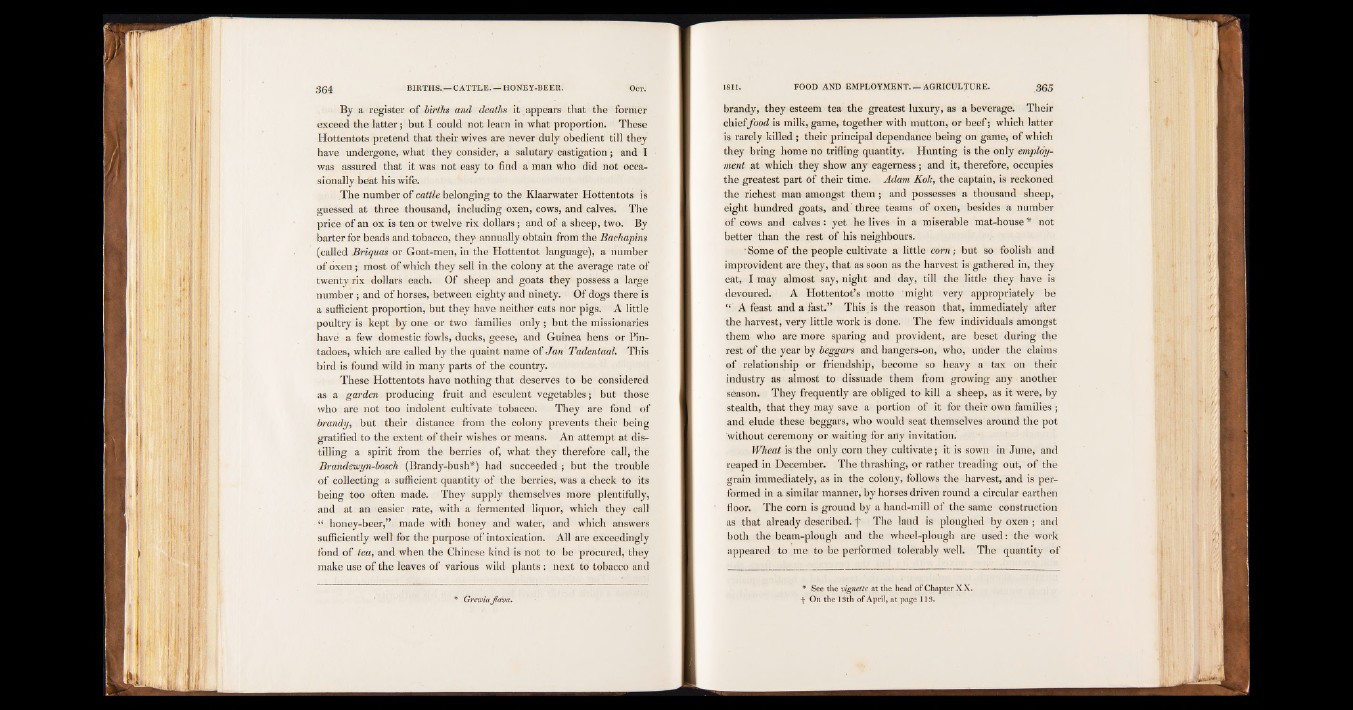
By a register of births and deaths it appears that the former
exceed the latter ; but I could not learn in what proportion. These
Hottentots pretend that their wives are never duly obedient till they
have undergone, what they consider, a salutary castigation ; and I
was assured that it was not easy to find a man who did not occasionally
beat his wife.
The number of cattle belonging to the Klaarwater Hottentots is
guessed at three thousand, including oxen, cows, and calves. The
price of an ox is ten or twelve rix dollars ; and of a sheep, two. By
barter for beads and tobacco, they annually obtain from the Bachapins
(called Briquas or Goat-men, in the Hottentot language), a number
of oxen ; most of which they sell in the colony at the average rate of
twenty rix dollars each. Of sheep and goats they possess a large
number ; and of horses, between eighty and ninety. Of dogs there is
a sufficient proportion, but they have neither cats nor pigs. A little
poultry is kept by one or two families only ; but the missionaries
have a few domestic fowls, ducks, geese, and Guinea hens or Pin-
tadoes, which are called by the quaint name of Jan Tadentaal. This
bird is found wild in many parts of the country.
These Hottentots have nothing that deserves to be considered
as a garden producing fruit and esculent vegetables ; but those
who are not too indolent cultivate tobacco. They are fond of
brandy, but their distance from the colony prevents their being
gratified to the extent of their wishes or means. An attempt at distilling
a spirit from the berries of, what they therefore call, the
Brandewyn-bosch (Brandy-bush*) had succeeded ; but the trouble
of collecting a sufficient quantity of the berries, was a check to its
being too often made. They supply themselves more plentifully,
and at an easier rate, with a fermented liquor, which they call
“ honey-beer,” made with honey and water, and which answers
sufficiently well for the purpose of intoxication. All are exceedingly
fond of tea, and when the Chinese kind is not to be procured, they
make use of the leaves of various wild plants : next to tobacco and
* GrewiaJlava.
brandy, they esteem tea the greatest luxury, as a beverage. Their
chieffood is milk, game, together with mutton, or beef; which latter
is rarely killed ; their principal dependance being on game, of which
they bring home no trifling quantity. Hunting is the only employment
at which they show any eagerness; and it, therefore, occupies
the greatest part df their time. Adam Kok, the captain, is reckoned
the richest man amongst th em; and possesses a thousand sheep,
eight hundred goats, and’three teams of oxen, besides a number
of cows and calves: yet he lives in a miserable mat-house* not
better than the rest of his neighbours.
• Some of the people cultivate a little corn; but so foolish and
improvident are they, that as soon as the harvest is gathered in, they
eat, I may almost say, night and day, till the little they have is
devoured. A Hottentot’s motto might very appropriately be
“ A feast and a fast.” This is the reason that, immediately after
the harvest, very little work is done. The few individuals amongst
them who are more sparing and provident, are beset during the
rest of the year by beggars and hangers-on, who, under the claims
of relationship or friendship, become so heavy a tax on their
industry as almost to dissuade them from growing any another
season. They frequently are obliged to kill a sheep, as it were, by
stealth, that they may save a portion of it for their own families ;
and elude these beggars, who would seat themselves around the pot
without ceremony or waiting for any invitation.
Wheat is the only corn they cultivate; it is sown in June, and
reaped in December. The thrashing, or rather treading out, of the
grain immediately, as in the colony, follows the harvest, and is performed
in a similar manner, by horses driven round a circular earthen
floor. The corn is ground by a hand-mill of the same construction
as that already described, f The land is ploughed by oxen ; and
both the beam-plough and the wheel-plough are used: the work
appeared to me to be performed tolerably well. The quantity of
# See the vignette at the head of Chapter XX.
f On the 13th of April, at page 113.